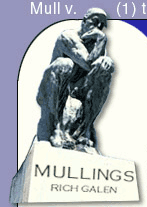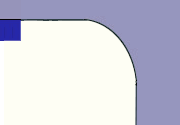|
|

|

Click here to keep up with Galen's Speaking Schedule
Looking for a back issue of Mullings? They're in the
Archives
Click here
to join the Mullings Movement!
Marietta College
Monday, October 20, 2003
The FALL SUBSCRIPTION DRIVE is still on! If you subscribed last Fall (not this past Winter) it's time. If you've never subscribed it's really time. In any event, go to the FALL SUBSCRIPTION DRIVE page and see what it's all about.
Wistfulness Alert!
Each year, I whine, moan, and - until I get to the Old Town Starbucks every morning - threaten a hunger strike over being denied a Pulitzer and/or a Nobel Prize. Not that I deserve either one, of course, but still; one likes to have been invited to the dance even if one can't dance.
This past weekend I received an honor for which I am no more deserving, but which means at least as much: At a small ceremony during Homecoming weekend at Marietta College I was presented with an award for being a "Distinguished Alumnus."
Marietta College, as regular Mullsters know, is located in Marietta, Ohio 45750.
It is one of a large number of small, liberal arts colleges which specialize in providing their students with a broad array of subject matter, a wide variety of thought regarding those subjects, and a requirement that students understand the notion that critical thinking about the world around us is crucial to being a successful member of society.
During my short remarks, (which began with the words, "So, after a year-and-a-half, I flunked out�) I invented the notion of the "intellectual quadratic equation."
According to the Mathworld website, a quadratic equation, "as a second-order polynomial equation, the fundamental theorem of algebra guarantees that it has two solutions."
Dear Mr. Mullings: Do you have ANY idea what that means?
Signed, Albert Einstein
No. Not a clue.
But it makes my point: One of the most important effects of a liberal arts education is the understanding that complex ideas probably have more than one valid solution. And that you can arrive at one of those solutions by a variety of routes.
Not only that, but even though I wouldn't know a polynomial equation from a cheeseburger, I knew that (a) quadratic equations exist and (b) that a quadratic equation has more than one answer.
I knew those things because I was forced to take a math class in college. I was also forced to take Constitutional Law; and a course in conservation, and a variety of speech classes (enough to know that a uvula is not a punch line from a Seinfeld episode); art appreciation; American and English lit; comparative government; the history of various regions and eras; and on and on for the full seven-and-a-half years of my undergraduate career.
The world in 2003 is so complex it is helpful to look at it as an intellectual quadratic equation: There are more than one solution and one of those solutions might be, what is now called "complex" but in my day was called "imaginary."
The answer to your next question is this: A quadratic equation which, for example, has as one of its solutions the square root of -4 would be a "complex" answer. There is no number which, when multiplied by itself, will yield -4.
When I was in college we were dependent to do research into things like quadratic equations upon a service called "The Readers' Guide to Periodical Literature." This, in 2003 is abbreviated, "Google."
A liberal arts education allows you to know that a potential connection (equation) exists; Google allows you to find it and help you understand it - or, at least, define it.
I don't think I deserved an award from Marietta College because, whether I had ever gone there or not, Marietta College would be doing just fine today.
But I am absolutely certain of this: Had I not attended Marietta College I would not be doing what I am today.
To all the small, liberal arts colleges in the country at which really smart professors are working to build another generation of understanding complex issues; Thank you.
Here's what's on today's Secret Decoder Ring page: A link to the Mathworld webpage upon which quadratic equations are further explained; the definition of a "uvula," a Mullfoto from this past Saturday morning; and an amusing Catchy Caption of the Day.
--END --
Copyright © 2003 Richard A. Galen
Current Issue |
Secret Decoder
Ring | Past
Issues | Email
Rich | Rich
Who?
Copyright �2002 Richard
A. Galen | Site design by Campaign
Solutions. | |
|







